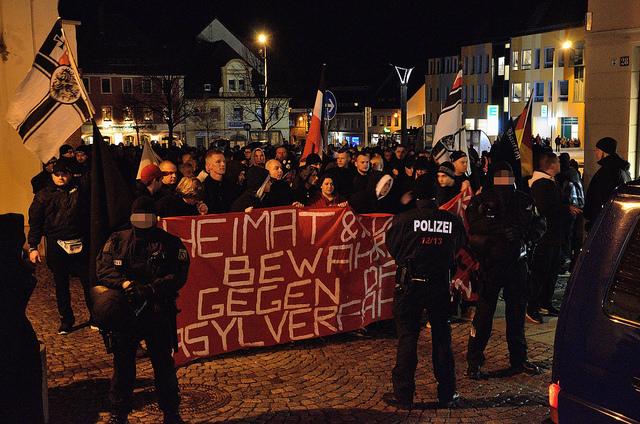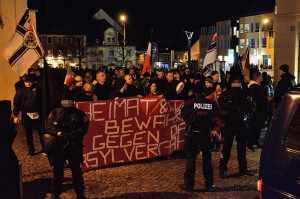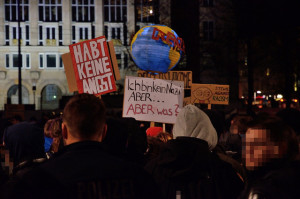The Battle for Germany’s Soul
 Police monitor a far-right anti-refugee protest in Bautzen, Saxony. Photo credit: Caruso Pinguin, Flickr Creative Commons.
Police monitor a far-right anti-refugee protest in Bautzen, Saxony. Photo credit: Caruso Pinguin, Flickr Creative Commons.
It is a scene that has become depressingly familiar. Between twenty to thirty masked attackers, armed with baseball bats, ambushed a group of Syrian refugees in Magdeburg, Germany, hospitalizing three of them, interrupted only when plainclothes police officers nearby intervened. It wasn’t the first or only such attacks, not even that night. That same night, in Wismar, another two refugees were assaulted. In both instances, the attackers disappeared into the night. Only one of the Magdeburg suspects was arrested, and none of those in Wismar. Such attacks are part of an unsettling trend in Germany, even as it receives praise for its comparatively humane treatment of refugees.

According to the Bundeskriminalamt, Germany’s federal criminal police agency, right-wing extremism has been responsible for 456 incidents of violence against refugees in the first three quarters of 2015 alone, double what it had been in all of 2014. They warn that the violence may be directed at those who are suspected of being refugees (read: nonwhite), as well as those who provide aid to refugees, who have already come under attack. The refugee crisis, it seems, has given the otherwise-disparate right-wing groups a common and immediate enemy, and the consequences of this unity have played out all across Germany.
Which is not to say that the Merkel government has taken this trend lying down. Both Merkel’s CDU and its coalition partner the SPD have called for a dramatic increase in personnel for both the Bundeskriminalamt and the Bundesamt für Verfassungsschutz, Germany’s domestic security agency. The Verfassungsschutz and the BKA play an important role in tracking and mitigating extremist movements and rallies when they occur, but their efforts are only a part of the battle against extremism. The other is in the hearts and minds of ordinary Germans. When an ARD reporter asked an opponent of refugee settlement in Freital, Saxony if she was afraid of “the people who throw firecrackers, throw stones [at refugees],” she shrugged. “They don’t throw them at Germans,” she said. “But they throw them at other people,” the reporter pressed. “But not at Germans,” she insisted. It is this apathy, this bland, shrugging moral cowardice, that gnaws at Germany’s soul as a nation.
This said, though violence has taken place across Germany, it has been proportionally more concentrated in the East, particularly in the state of Saxony, which has had twice as many incidents of violence per capita as the next-most violent state – 111 as of September of this year. Moreover, Saxony is a case study in the nature of political extremism itself. When, in 2004, the far-right Nationaldemokratische Partei Deutschlands (National Democratic Party of Germany, NPD) entered the Saxon Landtag (state parliament), the incumbent conservative Christian Democratic Union was faced with a choice: stand its ground and attempt to resist further NPD gains or pull to the right and attempt to poach the NPD’s newfound support. To Saxony and Germany’s chagrin, they chose the latter. Matthias Rößler, formerly a prominent voice on the CDU’s right wing, was named Landtagspräsident, (Speaker of State Parliament), in which capacity he has spoken out at length against the ongoing settlement of refugees in Saxony and Germany as a whole. And Rößler isn’t alone; Saxony CDU Party Chairman Frank Kupfer and Premier Stanislaw Tillig have both openly rejected Chancellor Angela Merkel’s assertion that “Islam belongs in Germany.” Such rhetoric pays dividends; in the most recent state elections, the NPD lost eight seats, while the populist and more broadly right-wing Alternative für Deutschland picked up fourteen.
To its credit, Saxony’s CDU has not openly incited violence against refugees, and when it does occur, as it did at the beginning of this month, party officials are quick to condemn the violence, nor has the federal party taken its Saxon counterpart’s hard turn to the right. But Saxony provides a case study in the broader effects of political extremism. Extremists, by definition, operate on the fringe of the body politic, and in doing so define the outer limits of political discourse. It doesn’t matter so much that their views may not be widely accepted as that they are uttered at all. Extremists do not generally triumph by winning electoral majorities or directly influencing policy, but rather when the institutional high ground of more moderate parties begins to adopt their platform. The CDU is not alone in feeling the ground move beneath its feet. The right-populist and chiefly Euroskeptic AfD, which has disavowed any far-right inclinations, has found itself drawn more and more into the NPD’s orbit, with AfD supporters at a rally in the state of Thüringen bearing old NPD signs with the party logo conspicuously blurred out but the content unaltered.

All of which leads to a simple but bedeviling question: what is a democratic state to do in the face of such extremism? The phrase “German right-wing extremism” no doubt conjures up a very specific set of associations – swastikas and jackboots, hatred and violence. It would be a grave mistake to think that these were relics of the past, consigned to the grave with the Reich for which they stood. The opposite is true. The BKA has noted with alarm the rise in “Verfassungswidrige Kennzeichen”, “Unconstitutional Displays” – the legal euphemism for the display of Nazi symbols, which remains a crime in Germany. That crowds of any size anywhere would rally around the swastika is alarming in itself – that they should do so in Germany of all places is indefensible. That such people should find sympathizers in the general electorate, among mainstream parties old and new, is beneath the dignity of the German people.
When the BKA and Verfassungsschutz increases were announced, CDU representative Thomas Strobl said “We will not allow right-wing extremists to besmirch Germany’s reputation as a cosmopolitan country.” There is a clear desire to preserve that reputation; CDU moderates and leftist elements alike have staged counter-protests in opposition to the NPD and their ideological allies. This preservation cannot come from the state alone. Surveillance and security can disrupt right-wing groups when they attempt to recruit and organize, but they do not address the simmering resentments that lie beneath. For that, ordinary Germans must take action in denouncing and defeating extremism in the public sphere. With the very soul of German liberal democracy on the line, it is something akin to an exorcism, seeking to drive out the last lingering demons of the Third Reich once and for all. One can only hope that they succeed.
